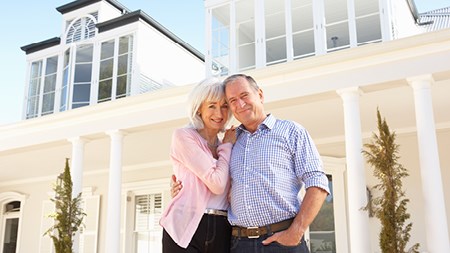The first thing to decide is whether to stay on in your existing home or move to a retirement village. If your health is good and you can manage independently or have reliable help, it can be quite feasible to stay in your existing home. And if you make use of the many smart tools available, you will probably find that you can safely enjoy your own home for many years.
Advantages of staying put include:
- You don’t have to move, which can be very stressful and costly.
- You are in a familiar environment, close to the neighbours, shops and other amenities that you are accustomed to.
However, your old home can present new challenges as you age, so it makes sense to take advantage of the smart technologies being invented to make life easier and safer.
See more: You don't have to downsize when you retire
These include:
- Programmable switches that will automatically turn off the heat if your stove has been unattended for a certain time, preventing possible kitchen fires that could lead to serious injuries and damage to your home.
- Smart lights that you can control remotely with your smartphone or programme to turn on and off according to a schedule, or when you enter and leave a room. Some can also respond to voice commands so you won’t have to try to find light switches in the dark.
- Security systems that use cameras and sensors to notify you when someone unrecognised is in your home and it isn’t safe to enter, and enable you to unlock a door remotely for family or friends. These systems can also show you images of someone ringing your doorbell or notify you if you’ve left the house unlocked.
- Medical alert systems include panic buttons for use at home. Some can also send emergency responders to wherever you are, guided by the GPS on your smartphone.
- Home cleaning and maintenance become more onerous as you get older, so it’s worth investing in automated vacuum cleaners, mops, lawn mowers and gutter cleaners that can all be controlled from your smartphone.
If you opt to move to a retirement village, you have a choice of a unit in a life rights scheme or a sectional title or freehold unit in a retirement complex. Any good retirement village should have first-class security and care facilities and transparency that provides financial security.
Read more: Choosing the right retirement home
The Housing Development Schemes for Retired Persons Act prescribes numerous rights for people buying into retirement villages, specifically life rights. Developers are subject to many rules and regulations forcing them to comply with the endorsement, so before signing an application you need to check that the scheme is established in terms of the act.
In a life rights scheme, you pay for the right for you and your spouse or partner to occupy a unit in a retirement village for the rest of your lives - no matter how long you both live. When you or your partner die, the surviving partner continues to live in the unit. However, if you remarry, your new spouse may occupy the unit with you, but will not be entitled to the life right ownership.
On the death of both owners, the purchase price is refunded to their estate - usually at 100%. Life right proceeds can be nominated to beneficiaries and fall out of the normal deceased estate red-tape.
There’s no VAT or transfer duty on the sale and no registration fees. Because you pay for the unit upfront you will have no monthly bond repayments or rental costs. There is greater certainty about levies and no surprise special levies for owners to be concerned about.
You are effectively a lessee, so any maintenance to the property is the responsibility of the property developer.
Life right properties are slightly cheaper than sectional title or freehold, and one of the benefits for residents is that the developer doesn’t simply make upfront profit and walk away. He has to commit to long term involvement in the complex.
A sectional title development may be great in the beginning, but as people age they become more conservative and less inclined to spend money on upgrades. So, while they believe they are looking after their investments, they are actually running them into the ground.
In the life right model the developer manages the amenities to high standards, and when a resident passes on, the home must be in excellent condition for prospective new owners. The clubhouse and other amenities largely decide the value the developer achieves from the sale of the remaining assets, so facilities must always be immaculate.
In a life rights scheme, you can rest assured that you will always be living in a first class complex without increasing levies.





